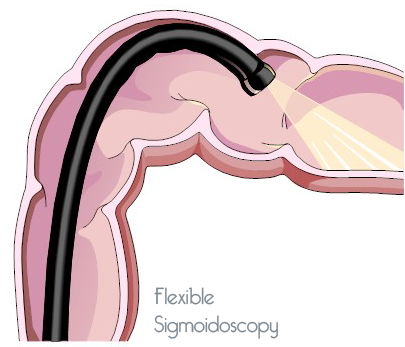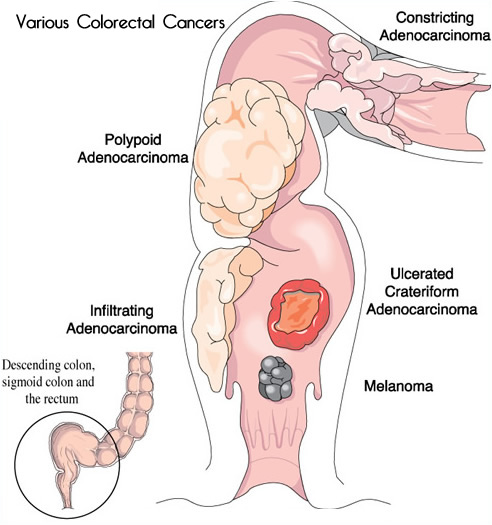
Screening For Colorectal Cancer
Screening tests help your doctor find polyps or cancer before you have symptoms. Finding and removing polyps may prevent colorectal cancer. Also, treatment for colorectal cancer is more likely to be effective when the disease is found early.
To find polyps or early colorectal cancer:
- People with average risk should start screening for CRC at 45 years of age
- People who are at higher-than-average risk of colorectal cancer should talk with their doctor about whether to have screening tests before age 45, what tests to have, the benefits and risks of each test, and how often to schedule appointments.
The following screening tests can be used to detect polyps, cancer, or other abnormal areas. Your doctor can explain more about each test:
Fecal occult blood test (FOBT): Sometimes cancers or polyps bleed, and the FOBT can detect tiny amounts of blood in the stool. If this test detects blood, other tests are needed to find the source of the blood. Benign conditions (such as hemorrhoids) also can cause blood in the stool.
 Sigmoidoscopy: Your doctor checks inside your rectum and the lower part of the colon with a lighted tube called a sigmoidoscope. If polyps are found, the doctor removes them. The procedure to remove polyps is called a polypectomy.
Sigmoidoscopy: Your doctor checks inside your rectum and the lower part of the colon with a lighted tube called a sigmoidoscope. If polyps are found, the doctor removes them. The procedure to remove polyps is called a polypectomy.
Colonoscopy: Your doctor examines inside the rectum and entire colon using a long, lighted tube called a colonoscope. Your doctor removes polyps that may be found.
GI Genius colonoscopy: GI Genius colonoscopy utilizes artificial intelligence to automatically help your doctor detect colorectal polyps that may otherwise be missed during a colonoscopy. DrBhandari uses Artificial Intelligence (GI Genius) at Monroe Surgical and the Endoscopy center of Monroe.
Clik to Download GI Genius Infornmation Brochure
Double-contrast barium enema: You are given an enema with a barium solution, and air is pumped into your rectum. Several x-ray pictures are taken of your colon and rectum. The barium and air help your colon and rectum show up on the pictures. Polyps or tumors may show up.
Digital rectal exam: A rectal exam is often part of a routine physical examination. Your doctor inserts a lubricated, gloved finger into your rectum to feel for abnormal areas.
Colon cancer found in the early stages has a survival rate as great at 90%
Symptoms
A common symptom of colorectal cancer is a change in bowel habits. Symptoms include:
Having diarrhea or constipation Feeling that your bowel does not empty completely Finding blood (either bright red or very dark) in your stool Finding your stools are narrower than usual Frequently having gas pains or cramps, or feeling full or bloated Losing weight with no known reason Feeling very tired all the time Having nausea or vomiting
Most often, these symptoms are not due to cancer. Other health problems can cause the same symptoms. Anyone with these symptoms should see a doctor to be diagnosed and treated as early as possible.
.
Usually, early cancer does not cause pain. It is important not to wait to feel pain before seeing a doctor.
.
In the United States, colorectal cancer is the fourth most common cancer in men, after skin, prostate, and lung cancer. It is also the fourth most common cancer in women, after skin, breast, and lung cancer.
Colorectal Cancer Rates Rising in Younger Adults
Colorectal cancer (CRC) is the second leading cause of cancer death worldwide and in the US when combining men and women. Alarmingly, it’s now the top cause of cancer death in men under 50 and the second in women of the same age group. This shift shows CRC affecting people as early as their 30s and 40s—a trend researchers attribute to a mix of genetic and environmental factors. These may disrupt the gut microbiome (the genetic material of microorganisms in the intestines), altering the immune system and increasing CRC risk in younger adults.
Prevention Starts with Screening
CRC is largely preventable with regular screening, now recommended to begin at age 45 (previously 50) for those at average risk. Screening methods depend on your risk level:
Average Risk (Age 45+, No Symptoms or High-Risk Factors)
- Fecal Immunochemistry Test (FIT): Yearly
- Cologuard: Every 3 years
- Colonoscopy: Every 10 years
Note: A positive FIT or Cologuard result requires a follow-up colonoscopy.
Symptoms Present?
- Rectal bleeding
- Changes in bowel habits
- Persistent abdominal pain
- Unintentional weight loss
- Chronic diarrhea
Action: Colonoscopy recommended.
Personal History?
- Previous colon polyps or CRC
Action: Colonoscopy recommended.
High-Risk Factors?
- Family history of CRC or precancerous polyps in a first-degree relative before age 60
- Multiple first-degree relatives with CRC or polyps
- History of Ulcerative Colitis or Crohn’s disease
- Known inherited CRC syndrome (e.g., Lynch syndrome)
Action: Colonoscopy recommended before age 45, with timing based on family history.
Advances in Detection
AI-powered polyp detection systems are improving outcomes. Studies show endoscopists with high adenoma detection rates (ADR) during colonoscopies better protect against CRC. With AI assistance, ADR increases by 14.4%, and every 1% ADR boost lowers the risk of interval CRC (cancer between screenings) by 3%.
The Good News
- Screening Gap: 1 in 3 US adults still skips CRC screening.
- Coverage: All health plans cover CRC screenings 100%.
- Survival: Early detection offers a 90% survival rate.
*Talk to your primary doctor today to schedule your screening.
Bal Raj Bhandari, M.D.
GI Genius Colonoscopy

